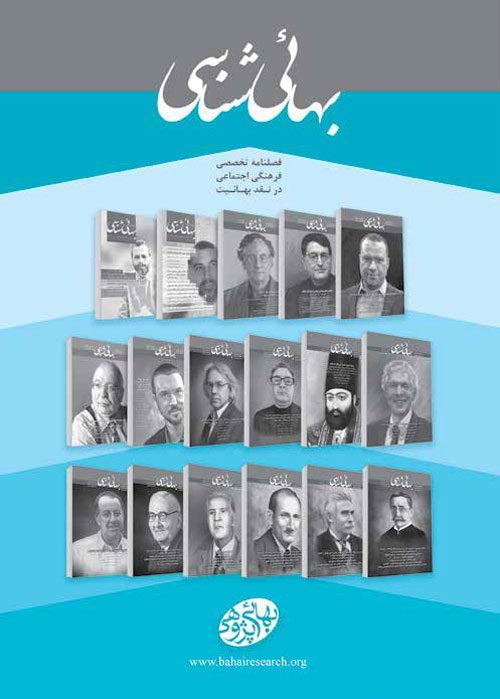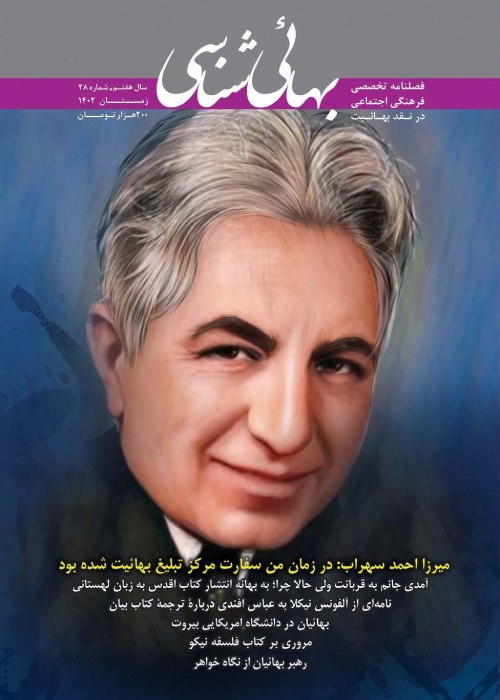فهرست مطالب

نشریه بهائی شناسی
پیاپی 20 (زمستان 1400)
- تاریخ انتشار: 1400/12/25
- تعداد عناوین: 11
- سرمقاله
-
صفحه 4
-
صفحه 6
-
آیت الله شیخ احمد شاهرودی: نماد تعامل عالمانه با بهائیان / گفت وگو با جناب آقای علیرضا مهدوی شاهرودی و جناب آقای سید مقداد نبوی رضویصفحه 34
-
فعالیت های مخفیانه عبدالبهاء علیه منتقدانش / گزارشی از ابراهیم جرج خیرالله به وسیله ادوارد براونصفحه 126
-
مفاوضات در ترازوی نقد / قسمت دوم تفسیر عبدالبهاء از مکاشفات یوحناصفحه 188
-
صفحه 226
-
Page 54
This article is about the Shaikhi narration of meeting of Haj Mohammad Karim Khan Kermānī with Mulla Sadegh Moqaddas Khurasani. The dialogue was very important because Haj Mohammad Karim Khan explained to him about his high position with Seyed Kazim Rashti and stated strong and convincing reasons against Bab's invitation.
Keywords: Mohammad Karim Khan Kermānī, Ali Mohammad Bab, Shaikhism, Babism, Mulla SadeghMoqaddas Khurasani -
Page 76
Edward Browne (Professor of Oriental Studies at the University of Cambridge) has conducted important researches in the fields of Babi and Baha'i studies, which are fundamental to the study of their histories and teachings. One of his most important works was the publication of the Book Nuqtat Al-Kaf, which challenged the foundation of the Baha’i Faith. This study, while reviewing his scholar work, deals with the book and shows the originality of this work by referring to the reaction of the Baha’is to it.
Keywords: Edward Browne, Mirza Mohammad Khan Qazvini, Abbas Effendi, New History, NuqtatAl-Kaf -
Page 110
Mirza Mahdi Amin (nicknamed as Esmollah Al - Hami), who was a well-known Azali and a friend of Edward Browne, at the end of his book “Rejection of the Baha'is - the reason for the astonishments ”(Dalil al – Motehayyerin) lists some of the shortcomings of Browne’s introduction to the book “Nuqtat Al-Kaf “. This text is a short glimpse of the Azalis' reasons - based on the works of Bab- about the invalidity of the Baha’is claims. There are reasons to show that Baha'u'llah could not be the person whom He (the Bab) had promised to come.
Keywords: Mirza Mahdi Amin, Edward G. Browne, Nuqtat Al-Kaf, Subh Azal, Bahaal – Motehayyerin -
Page 126
The unity of the human world is one of the important teachings of the Baha’i Faith, based on which Baha’i leaders, including Abdu'l-Baha, recommend that all human beings, friends and foes alike, be treated kindly and viewed with one eye, even if one he oppressed you, not only should he not retaliate, but he should also be treated well. However, when we look at history, we come across behaviors from Abdul-Baha’ that are quite to the opposite of such advice. This article discusses two examples of those behaviors: the threat of Ibrahim George Khayrullah to assassinate and the murder of Mirza Yahya. The important thing about these two people is that they were both Baha'is and, of course, after some time they had disagreements with Abdu'l-Baha.
Keywords: Abdul-Baha’, Ibrahim George Khayrullah, Edward Brown, Murder, Threat of Murder -
Page 146
The Baha’is claim that Taqiyya (Dissimulation) is forbidden in the Baha’i Faith, and they considers it to be a kind of hypocrisy and lying. However, examination of various documents shows that Baha’i leaders and elders believed in and commanded it, but it has been banned during the Shoghi's leadership. Kamran Iqbal, retired director of the Department of Middle East and Islamic History of the University of Bochum, Germany, has published an interesting article on this subject and provided important evidences from Baha'i sources. One Baha'i wrote a critique about it, and Dr. Iqbal responded to him. Here Iqbal’s article and his answer are reviewed.
Keywords: Taqiyya, Wisdom, Lies, Baha’is, Baha'u'llah, 'Abdu'l-Baha, Shoghi Effendi, KamranIqbal, Muhammad Mustafa Baghdadi -
Page 188
Last year marked 100th anniversary of the death of Abbas Efendi, Abdu'l-Baha. He was the eldest son of the founder of the Baha’i Faith and he is referred to by lofty titles such as "Serullah" (the mystery of God). On this occasion, this article deals with one of his most important works, Some Answered Questions (Mofavezaat). In this book, which include the questions and answers between Clifford Barney and him, 'Abdu'l-Baha interprets John's Revelation in the New Testament and adopts its apocalyptic literature to Bab and Baha’u’llah. In this research, an attempt has been made to investigate the shortcomings of Abdu'l-Baha's interpretation and its incompatibility with the real and historical events.
Keywords: Abdu'l-Baha, Controversies, Revelations of John, Bible, Some Answered Questions -
Page 206
This article explains the project named Baha'i Studies by exploring the keyword Baha’i scholarship. According to the article, Baha’i Studies refers to a long-term strategy that has been clearly taken seriously since the time of Shoghi Effendi. Although this grand project was not carried out during Shoghi's lifetime, it was followed with vigor and precision. The second half of the twentieth century shows the formation and development of this project. Baha’I Studies covers the idea that the flow of knowledge about Baha’ism should not be defined by non-Baha’is, and the Baha’i community should not be passive in this regard. Secondly, to establish a strong connection between the Baha’is and the current sciences; and thirdly, to involve the Baha’is in the process of resolving global problems! The ultimate goal of this project is to conquer the gates of the World Order by the Baha’is.
Keywords: Baha’i Studies, Scholarships, Bahai Institutions, World Order


